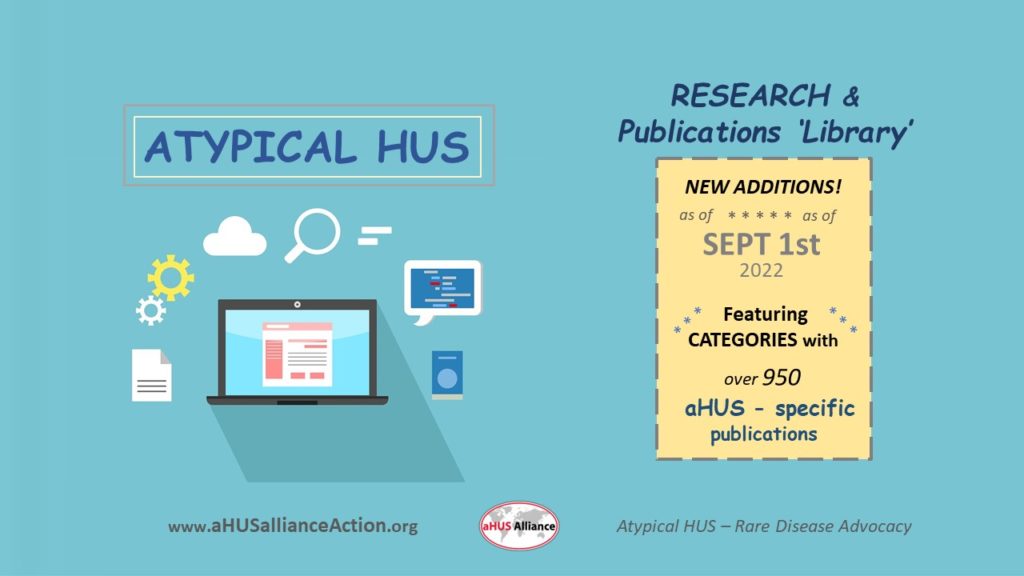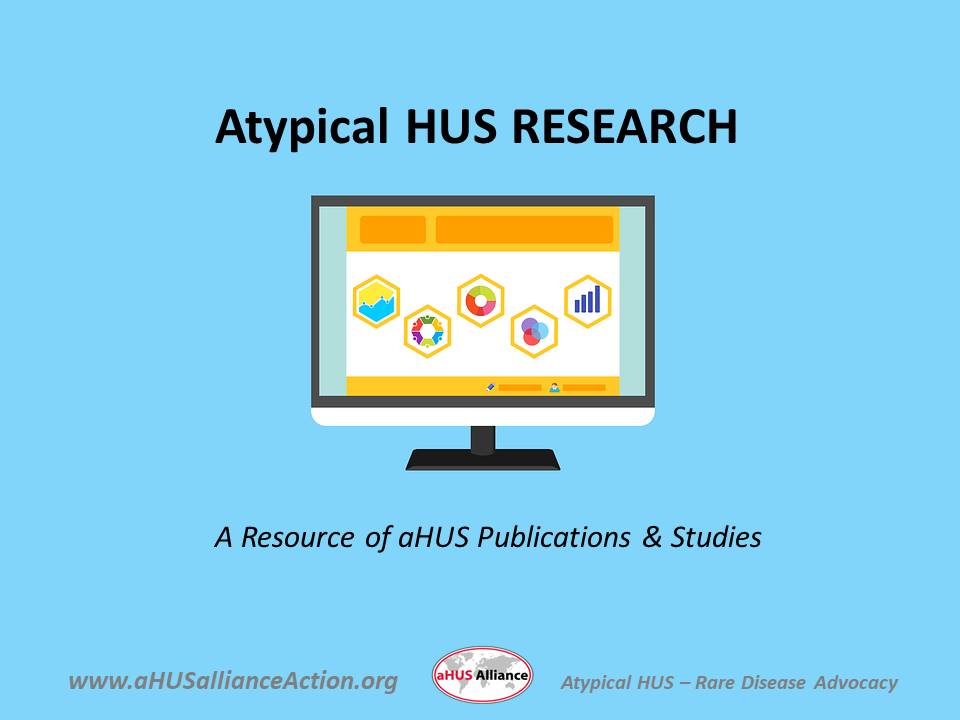
Atypical HUS patients and family caregivers are direct consumers of medical information and research, as we have a vested interest in learning about a medical condition that affects us personally. Since aHUS affects only a handful of people per million, aHUS patient education materials understandably aren’t part of the traditional informational array available during a visit to our primary care physicians. That’s why global patient advocates keep aware of what’s out there for existing information, and why we’ve stepped in to identify and help to bridge certain gaps. One of those bridges has been our aHUS Research and Publications page, a virtual ‘library’ of aHUS specific publications.
People with atypical hemolytic uremic syndrome are at a distinct disadvantage in trying to find updates on new aHUS knowledge, current research efforts, and drug development. Not only is aHUS rare, but the information stream is fragmented for both patients and for physicians who treat them. In conducting an online search, you’ll find information about atypical HUS tagged with various keywords such as ‘complement’ and ‘thrombotic microangiopathy’. To further complicate matters aHUS studies and publications cut across multiple disciplines, so information may be found within hematology, nephrology, immunology, complementology, or critical care information streams. Add to this the current conversation regarding new classification of the disease itself (our article on the aHUS nomenclature project), and it becomes clearer not only regarding information flow but also what multiple barriers exist for the aHUS studies and clinical trials.
The aHUS Alliance Global Action team has streamlined the search of aHUS research and publications with creation of an online ‘library’ specific to atypical HUS. At over 950 unique entries, our aHUS Research & Publications page is organized by topic. If you’re interested in updates of “‘New Research’, we have a scrolling list to answer the question of what current studies or new information has just reached the public domain (newly updated, as of 1 Sept 2022). More interested in a particular topic, such as ‘Pregnancy’ or ‘Transplant’? Just scroll down the page to view to find our category for that topic, with newest research for that area listed at the top of each scroll.
Scroll categories are: New Research, Critical Care, Diagnosis, Treatment, Discontinuing Treatment/Relapse, Thrombotic Microangiopathy (TMA), Extra Renal (Effects on Organs other than Kidneys), Pregnancy, Transplants, Genetics, Complement, Secondary aHUS, Triggers, Research in Specific Nations, Case Studies, Patient Registries: Publications, Drug Discovery/Research, Summary Articles/Literature Reviews, Consensus Documents/Guidelines, and Varied Topics. (Note: All entries from the ‘New Research’ scroll additionally are cross-listed at the start of each specific topic. While this ‘library’ has over 950 unique publications, it results in over 1400 dual entries – such as a study that examines mutation impact on disease management, and thus listed on both Genetics and Treatment scrolls.)
As patients and family caregivers ourselves, the volunteers of our global aHUS patient organization have a keen sense of how important it is to keep informed with updated information and research. Matters that affect us include medical care and treatment, but also other key areas such as family genetics and new aHUS treatments that may be on the horizon (See the global agenda for aHUS research priorities at bit.ly/aHUSpatientResearchAgenda).
Not everyone with the same genetic mutation will experience aHUS in a similar way, and each patient and their family will experience lifestyle impact and disease burdens in unique ways. Meaningful discussions between aHUS patients and their medical team gain firmer footing when aHUS families strive to understand this complex disease and more concisely ask questions or can explain their concerns during appointments. Medical teams can adopt a multi-disciplinary, holistic view to gain more awareness regarding how very differently atypical HUS impacts individual patients in regard to the disease duration, severity, and organs impacted. It’s in the best interest of patients and aHUS family caregivers to keep informed about aHUS advancements, and to foster a ‘trickle up’ approach regarding new aHUS-specific publications by sharing this information flow to our medical teams.
As the old adage goes, the best place to find a helping hand is at the end of your own arm. There are many more issues and concerns that face aHUS patients and family caregivers, so the aHUS Alliance Global Action team has shared a “How To” article outlining how you can use our 5 step process to find research online (click HERE to view) Still, there’s much to be grateful for regarding the people, groups, and individuals who include patients and family caregivers as integral and valued partners. We’re grateful to those who invite aHUS advocates to share broad views of issues that affect families, those who integrate patients/caregivers into studies and clinical trials, those who unite aHUS information flow, those who make certain that information on websites and articles are both meaningful and accessible to all aHUS patients and caregivers. Integrating aHUS patient voices is critical, and the newly formed global ‘aHUS Community Advisory Board‘ will be provide a valuable connecting point. A most sincere thank you to all who connect aHUS topics and efforts which invite discussion and share information – it helps us all.
Questions about the aHUS Research & Publications page, to include suggestions for inclusion of additional aHUS studies and research articles, can be directed to the page curator E: linda@ahusallianceaction.org (Let us know of additional aHUS publications to include)


